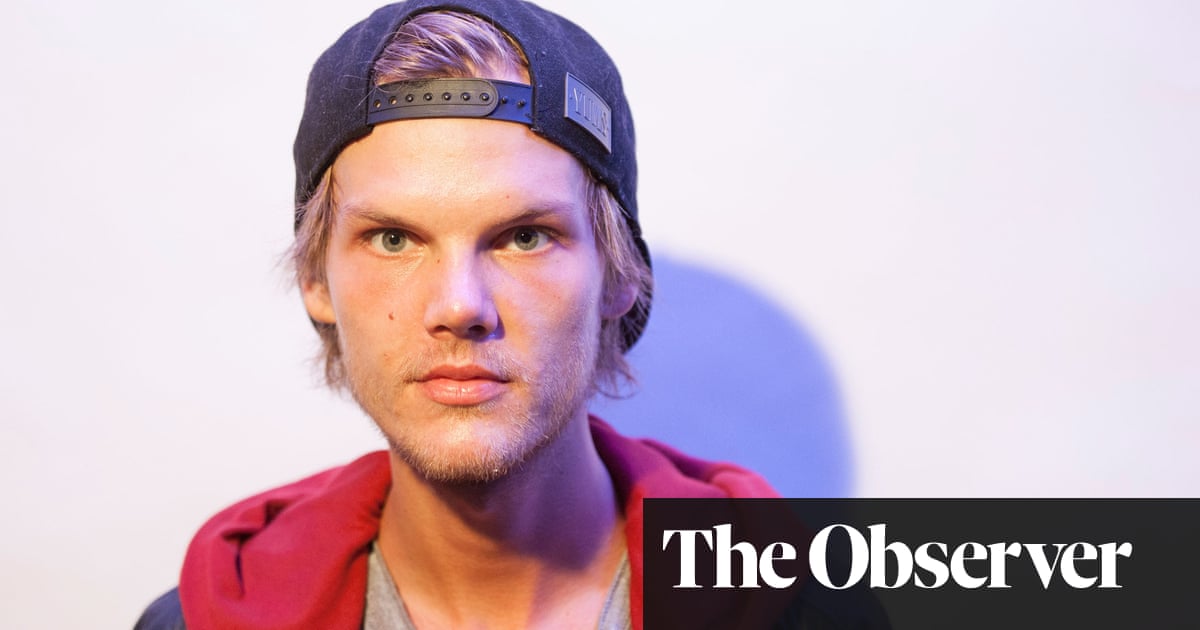Tim: The Official Biography of Avicii by Måns Mosesson review – private struggles of the EDM poster boy
Show caption ‘Confused by what felt like a torrent of insights’: Tim Bergling, AKA Avicii, in 2014. Photograph: Gabriel Olsen/Getty Images Book of the day Tim: The Official Biography of Avicii by Måns Mosesson review – private struggles of the EDM poster boy An honest study of the shy young man turned superstar DJ illuminates his rise to fame and the manifold factors that played a part in his death aged 28 Kitty Empire @kittyempire666 Tue 4 Jan 2022 07.00 GMT Share on Facebook
Share on Twitter
Share via Email
Tim Bergling – the Swedish DJ and producer known as Avicii – killed himself in Muscat, Oman, in April 2018 at the age of 28. The very worst happened when things were apparently looking up. The successful but troubled electronic dance music (EDM) star had retired from relentless touring in 2016 to focus on his wellbeing. He had weaned himself off opioids – prescribed by doctors when bouts of alcohol-induced pancreatitis led to debilitating pain and, later, surgery. He was communicating regularly with a therapist, was often surrounded by childhood friends, donated to charities. He meditated.
Having crossed over from pure party music to making tracks alongside established stars such as Coldplay and Nile Rodgers, Bergling was working on new material he was excited about. A documentary about his meteoric rise and his stress levels – Avicii: True Stories – had been broadcast in 2017, seemingly with a happy ending.
He would meditate intensely for hours, impatient to achieve enlightenment at speed
When it appeared on Netflix, True Stories reverberated well beyond club culture, super-charging the existing public debate around the mental health of performers. Viewers were witness to a life unravelling, privy to alarming practices that were normalised.
Stardom has always come at a high price, but in EDM, capitalising on your hot streak seemed especially urgent. Quite aside from the usual hedonism, the hours an ambitious, in-demand EDM DJ had to keep were gruelling: multiple gigs in one night, sometimes in different countries or time zones, with constant travel (especially hard for the flight-phobic Bergling) and scant basic self-care. In 2019, an anonymous book by another industry insider, The Secret DJ, went even deeper into the lunacy of the lifestyle.
Tim: The Official Biography of Avicii retells Bergling’s story, adding considerable context and lashings of pain: parents Klas and Anki Bergling are major sources. Written by Swedish journalist Måns Mosesson and translated by a US academic Brad Harmon, the book’s slightly wide-eyed tone finds strait-laced grownups grappling with the extremes of youth, from World of Warcraft – an obsession of the younger Bergling – to the wild west of club culture, via the monomaniacal perfectionism of digital music-making.
Avicii DJing at the Ultra Music festival in Miami, March 2012. Photograph: Jason Nevader/WireImage
The book succeeds in fleshing out Bergling, an elfin poster boy for hyper-commercial EDM who wanted to be taken seriously as an artist. Mosesson is very good on the path to fame and the wider ecosystem around Avicii. A shy, curious, stubborn youngster who feared he would get cancer, he suffered from serious acne and social anxiety, affecting his self-esteem. An interest in the esoteric led Bergling to name himself after a particularly punishing zone of Buddhist hell. He ended up in something like it.
Mosesson had access to Bergling’s rehab journal and almost everyone in his life – ex-girlfriends, childhood pals, fellow superstar DJs, psychotherapists. The author was also privy to Bergling’s digital life – texts, emails and messageboard posts; a level of intimate access biographers must surely have only dreamed of until now.
Bergling’s former manager, Arash Pournouri, declined to participate. After Bergling’s death, online opinion swirled around the relentless schedule over which Avicii’s management had presided. But in a recent interview, Bergling senior was specific in exonerating Pournouri, with whom his son had reconciled, and keen to examine the bigger music industry picture, beating the drum for swifter mental health interventions.
There are no kneejerk conclusions here, just candour and context: pressure, both external and internal, absolutely played a role in Avicii’s unravelling, as did the US prescription opioid scandal. As the book draws to its harrowing ending, Mosesson offers up a series of factors at play in 2018.
Although he had kicked virtually everything else, Bergling still smoked a lot of weed. The book discusses how insidiously – or suddenly – psychosis can affect THC users.
Bergling became involved with transcendental meditation, which he credited with reducing his anxiety. But he would meditate intensely for hours, impatient to achieve enlightenment at speed. In messages to his therapist, he confided that he had become confused by what felt like a torrent of insights. At the same time, Bergling texted his mother, full of love and excitement about a move from LA back to Stockholm.
In the aftermath of Bergling’s death, many of his closest associates sought help for their own issues and dependencies. The DJ’s father is especially keen that the word “suicide” be used in relation to his son; to speak plainly about what the mental health charity (Tim Bergling Foundation) set up in the DJ’s memory calls “a global health emergency”.
• Tim: The Official Biography of Avicii by Måns Mosesson (translated by Brad Harmon) is published by Sphere (£20). To support the Guardian and Observer order your copy at guardianbookshop.com. Delivery charges may apply











